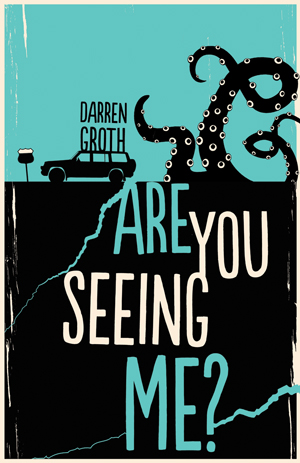| ________________
CM . . .
. Volume XXI Number 32. . . .April 24, 2015
excerpt:
Nineteen-year-old Justine Richter and her twin brother Perry, a young man with autism spectrum disorder (ASD), are on a road trip from Australia through the Pacific Northwest. The metal detector at the airport has frightened Perry, and Justine worries that it will emit a noise too loud for him to handle. Luckily, Justine remembers the comfort kit and throws her brother a lifeline in the form of his favourite earthquake book. Looking at the book breaks the hold his anxiety has on him, and he proceeds through the security area. Another potentially bad situation diverted with Justine’s capable response, although as we see later in the book, Perry has his own skill set and at times acts just as capably as his sister might in difficult situations. Since their father lost his battle with cancer a year ago, the Australian twins have made some big decisions, one being that Perry is soon to move into an assisted-living situation that their father, a single-parent, had arranged before he died. Justine thinks Perry wants to move into the place as a step towards independence even though Fair Go won’t necessarily cater to his particular interests or skills. Perry thinks Justine needs to be free of him so that she can live her own life, just as their mother did when she abandoned the family 15 years ago. But while his assessment of Justine is not correct, his understanding of the manner in which their mother left is sadly accurate. Before Perry’s planned move to Fair Go, he and his sister are taking a road trip to North America. For Perry, the adventure is a celebration of his favourite things: mythical sea monsters, Jackie Chan movies, and the study of earthquakes. For Justine, it’s a chance to reconnect with their mother, Leonie, a secret she has kept from Perry until after they have arrived in Vancouver. As Leonie’s story unfolds, we see a striking picture of both her inability to cope when the twins were small and the regret she has carried over the many years lost. Told in six sections alternating between Justine and Perry, Are You Seeing Me? is an authentic picture of autism spectrum disorder and sibling relationships as well as Leoni’s backstory as it unfolds through Perry’s flashbacks and her own explanations. According to the American Psychiatric Association, whose current diagnostic guidelines are utilized in Canada and appear in the fifth edition of the Diagnostic and Statistical Manual of Mental Disorders, a diagnosis of ASD implies a number of areas of difficulty, including communication deficits, overdependence on routines, and high sensitivities to change. Groth exemplifies these things very well in his characterization of Perry, yet skilfully manages to depict ability alongside disability without falling into the trap of stereotypically juxtaposing excessive talents to balance inherent challenges. “I think he’s more than that,” argues Perry’s mother against Justine’s statement that Perry is “quite capable.” After meeting her son for the first time after 15 years, Leonie confides, “I think he’s gifted.” “No,” counters Justine, “…he’s capable. He’s more aware than most of the world around him. He notices things in people that might not be clear to others. He takes in a lot—more than he’s equipped to handle, in fact. He senses energy and he feels change. Does that make him worthy of respect? Absolutely. Does that make him…I don’t know, the Oracle of Delphi? Hardly.” Perry’s abilities aren’t the only thing Justine teaches their mother about; Justine also educates Leoni on preparedness and how to be aware when Perry is spiralling into an episode: “…it’s crucial to distract, redirect. Get in his face. Tell him to look at you, to focus on you. Ask him if he’s seeing you. If that does nothing…then use one of his comfort items to snap him out of it…If there are creeps hanging around, stay away from some of the less age-appropriate items. He doesn’t need any extra embarrassment.” In response, Leoni nods and promises to remember Justine’s advice. “But remembering is a lot easier than doing,” Justine narrates. “Doing is hard.” Seeing people clearly is a theme that comes through strongly in this title, going far beyond a simple strategy to support Perry’s self-control and into a message about social connections. Perry, for example, perceives a great deal about their mother and offers her the thing that she has wanted without believing she could receive it—the forgiveness of the children she abandoned. In comparison with the richly drawn characters of Justine, Perry and Leonie, the twins’ father is much less complex with his story delivered in a rather contrived way through journal entries written to Justine that are integrated throughout the storyline. An even flatter character is Justine’s boyfriend Marc, whose telephone conversations seem unexpectedly stilted. Nevertheless, the story is carried by Justine and Perry, and Groth has provided a praiseworthy addition to the currently available titles dealing with ASD as well as a strong young adult read that will hold its own among other intelligent titles for this age group.
Highly Recommended. Bev Brenna is the author of 11 books for young people including The White Bicycle, third in a trilogy about a character with ADS and shortlisted for a 2013 Governor General’s Award. Stories for Every Classroom (Canadian Scholars Press), her newest publication, is a close examination of Canadian fiction presenting characters with disabilities. Bev is currently Acting Associate Dean for the College of Education, University of Saskatchewan, where her research interests are children’s literature and literacy (www.beverleybrenna.com).
To comment
on this title or this review, send mail to cm@umanitoba.ca.
Copyright © the Manitoba Library Association. Reproduction for personal
use is permitted only if this copyright notice is maintained. Any
other reproduction is prohibited without permission.
Next Review |
Table of Contents for This Issue
- April 24, 2015. |
